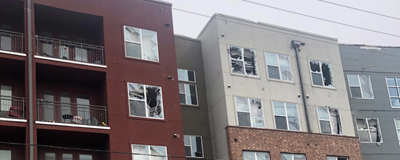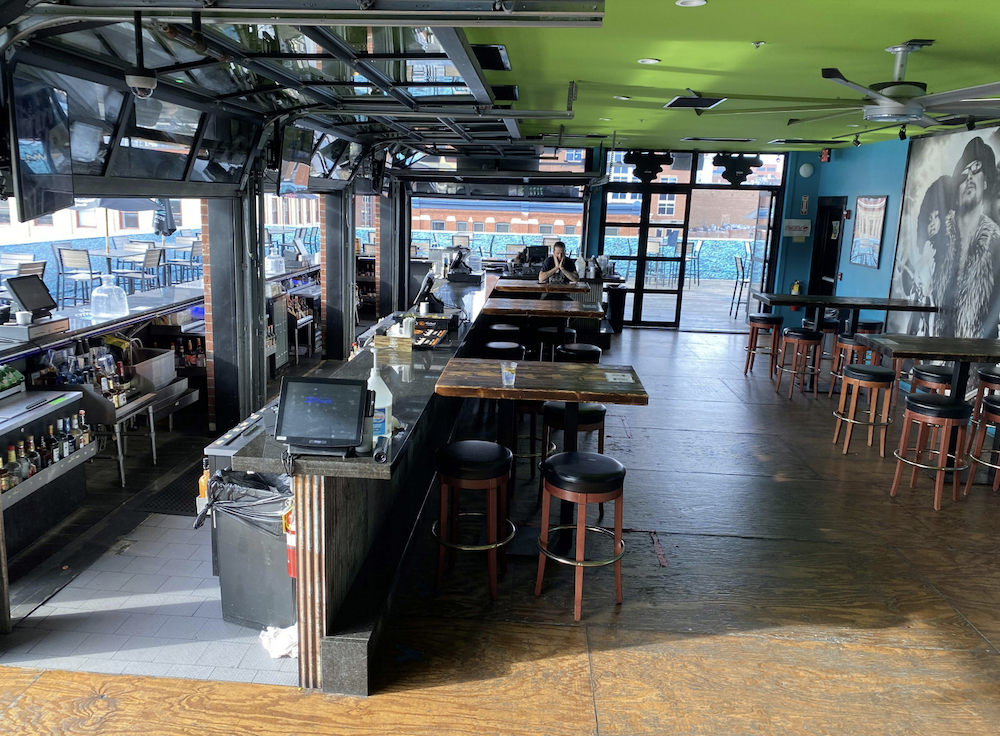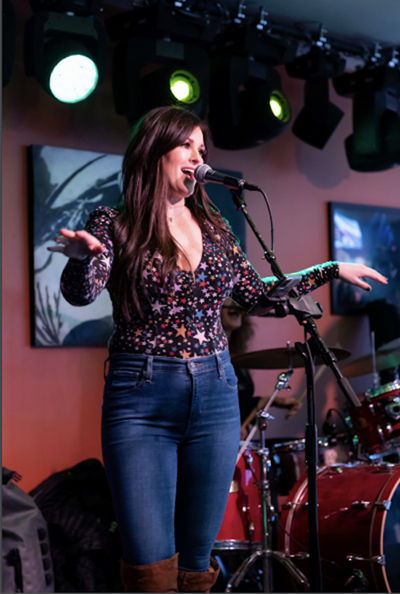Kerri-Ann Griffith had just returned to her apartment in the Germantown neighborhood after an evening out with friends when the lights started to blink. Then the howling started. She grabbed her cat, Jaeda. "We were both screaming." It was March 2020, and a deadly tornado had just touched down in Nashville. When the wind stopped and Griffith stepped onto her balcony, she saw debris everywhere. She was evacuated from her building and, after spending a night in the Farmer's Market, moved into her parents' home while she tried to figure out what to do next.
It was March 2020, and a deadly tornado had just touched down in Nashville. When the wind stopped and Griffith stepped onto her balcony, she saw debris everywhere. She was evacuated from her building and, after spending a night in the Farmer's Market, moved into her parents' home while she tried to figure out what to do next.

A honkytonk, without the customers. Photo/Keri-Ann Griffith
A week later, she learned that the honkytonk and steakhouse where her band played four nights a week was temporarily shutting down because of COVID-19. Every venue was shutting down. Broadway, a major thoroughfare that connected neighborhoods to Nashville's Music Row, was empty. Griffith, nursing a cough, says she was grateful that at least she didn't have to ask off from work for a chance to rest. Then, she visited a COVID-19 testing site. The diagnosis was positive; Griffith had COVID-19.
The singer had been struck by just about every disaster to hit Nashville over the past year, says Eddie Latimer, CEO of Affordable Housing Resources (AHR), a NeighborWorks network organization in Tennessee. Even the bombing in Nashville on Christmas morning, which brought destruction to Second Avenue, forced her to lose work hours again when the honkytonk, which had been offering livestreaming concerts in place of "live" experiences, closed again as police investigated the area.
Griffith had moved into a new apartment by then, but she was having trouble meeting rent costs as the pandemic wore on. "I had days where I was, ‘Oh my God, what am I going to do?'" says Griffith, who applied for unemployment but had a long wait as the department tried to figure out what to do with musicians and entertainers relying largely on gig work. "But I knew there were other people in worse situations. There were people who completely lost everything in the tornado. We were safe. We were alive. That was all I could ask for."
pandemic wore on. "I had days where I was, ‘Oh my God, what am I going to do?'" says Griffith, who applied for unemployment but had a long wait as the department tried to figure out what to do with musicians and entertainers relying largely on gig work. "But I knew there were other people in worse situations. There were people who completely lost everything in the tornado. We were safe. We were alive. That was all I could ask for."
As she tried to make ends meet, AHR was able to help her obtain forgiveness for three months rent and cover three more months using emergency rental assistance funding through the Coronavirus Aid, Relief and Economic Security (CARES) Act. "I saw they were helping in our county, so I applied and they helped," Griffith says of AHR.
Funding from NeighborWorks America's Critical Relief Fund helped cover AHR's administrative costs as they administered over $1.6 million of rental assistance through the CARES Act to Nashville residents. AHR helped more than 500 people who had lost income due to COVID pay sixth months in rent. The NeighborWorks Critical Relief Fund was made possible with assistance from the Wells Fargo Foundation, which committed, early on in the pandemic, to finding a way to help keep people housed.
Latimer says two other grants from NeighborWorks early on in the pandemic – $20,000 in flexible spending and a $45,000 buy tarps following the tornado – also helped the organization. COVID-19 complicated recovery from the tornado, he says. "It complicated everything. We got hit really hard by the pandemic."
In Nashville, known as Music City, more than 71,000 jobs are related to the hospitality industry. "Our No. 1 industry is the tourist industry, and honkytonks and music venues, they all got completely wiped out," Latimer says. Schools and universities were also hard hit. In April, Tennessee Governor Bill Lee announced the lifting of local restrictions and many bars and honkytonks have reopened, including the one where Griffith performs regularly. "But it's been a really long year."
Griffith says she is beginning to see tourists in the crowd once more when she performs with The Anita Hill Band. "It's been great to see people from all over the world again," says Griffith, a performer for 25 years. "Not being able to play for anybody was really bizarre."
Meanwhile, AHR continues to work with residents facing difficulties related to COVID-19 and the other disasters, this time with a focus on mortgage mitigation. Grants, like the one they received from NeighborWorks and Wells Fargo, "were vital for us this year; just vital," Latimer says. "People call us every day for help."

